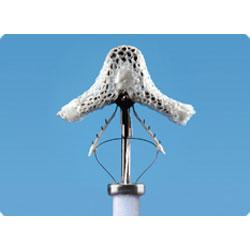
Abbott's MitraClip System
March 14, 2010 — Late-breaking data presented at the American College of Cardiology's 59th annual scientific session from the landmark EVEREST II (Endovascular Valve Edge-to-Edge REpair STudy) trial suggests that an investigational minimally invasive mitral repair device may be an effective treatment option for patients with significant mitral regurgitation (MR).
Abbott's investigational MitraClip system met both its primary safety and effectiveness endpoints. At one year, the MitraClip device demonstrated meaningful clinical benefits, including improvements in heart function, quality of life, and normal physical activity, and a decrease in cardiac symptoms.
The MitraClip system includes a catheter-based device, which is delivered to the heart through the femoral vein. The device is designed to reduce significant MR by clipping together the leaflets of the mitral valve, one of the four valves of the heart.
MR is the most common type of heart valve insufficiency and occurs when the leaflets of the mitral valve do not close completely, causing blood to flow backwards and leak into the left atrium of the heart during the cardiac cycle. To maintain an adequate forward flow of blood throughout the body, the heart compensates by increasing the size of the left ventricle to accommodate the increase in the volume of blood it is pumping.
Mitral regurgitation affects more than 8 million people in the United States and Europe and is currently managed with drugs or open heart surgery, depending on an individual patient's severity of MR and risk factors. Significant MR is a debilitating condition where the heart's ability to function continues to deteriorate over time, and may lead to irregular heartbeat, heart failure, stroke, heart attack or death.
"In the EVEREST II trial, the catheter-based system exhibited a highly favorable safety profile, while providing meaningful and sustained clinical benefits," said Ted Feldman, M.D., director, Cardiac Catheterization Laboratory, and The Mr. and Mrs. Charles R. Walgreen Chair in Interventional Cardiology, NorthShore University HealthSystem, Evanston, Ill., and co-principal investigator of the EVEREST II trial. "The positive trial results validate my experience that the procedure is a valuable therapeutic option for select patients with mitral regurgitation. The therapy has the potential to transform the lives of thousands of patients, and enable some to go from bed rest to a more active lifestyle."
In the EVEREST II trial's primary safety endpoint of major adverse events (MAEs) at 30 days, the MitraClip system demonstrated a superior safety profile (p
In the primary effectiveness endpoint, the MitraClip device was non-inferior to surgery at one year (clinical success rate of 72.4 percent for MitraClip patients with successful initial treatment compared to a
clinical success rate of 87.8 percent for surgery patients). With 95 percent confidence, the clinical success rate of the MitraClip device falls within 25.4 percent of the clinical success rate of the surgical control.
At one year, the MitraClip procedure demonstrated meaningful clinical benefits in the following secondary endpoints in patients with successful initial treatment:
· A reduction in the severity of MR, with 81.5 percent of patients improving to mild (grade 1+) or moderate (grade 2+) MR whereas at baseline 95.6 percent of patients had moderate-to-severe (grade 3+) or severe (grade 4+) MR (p
· A reduction in both the volume (left ventricular diastolic volumes) and the diameter of the left ventricle heart chamber (left ventricular diastolic dimensions), indicating an improvement in heart function. Left ventricular diastolic volumes decreased a significant 13 percent (p
· An improvement in symptoms, with 97.5 percent of patients exhibiting no symptoms (NYHA Functional Class I) or mild symptoms (NYHA Functional Class II) [p
· Meaningful improvements in both physical and mental quality of life compared to baseline as measured by the SF-36 Survey (increase of 4.7 points in the physical quality of life score [p
"When treating patients with significant MR, clinicians need to consider the benefits of the available treatment options and an individual patient's risk factors to determine the best course of therapy," said Charles A. Simonton, M.D., divisional vice president, Medical Affairs, and chief medical officer, Abbott Vascular. "Based on the positive risk-benefit profile demonstrated in the EVEREST II randomized trial and other EVEREST trials, the MitraClip procedure has the potential to be an important addition to the current options for treating certain patients with significant MR."
The MitraClip system received CE Mark in March 2008. It is currently under FDA review, and Abbot anticipates FDA approval in 2011.
The EVEREST II trial is the first randomized trial of any minimally invasive mitral valve repair device compared to mitral valve surgery.
For more information: www.abbott.com


 January 05, 2026
January 05, 2026 









